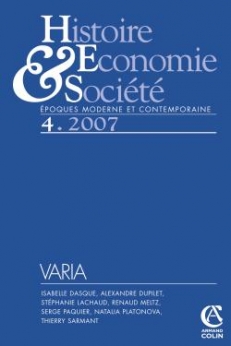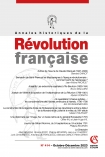
Histoire, économie & société (4/2007)
Pour acheter ce numéro, contactez-nous
Recevez les numéros de l'année en cours et accédez à l'intégralité des articles en ligne.
Le nom de Saint-John Perse nous est plus familier que celui d’Alexis Léger. Le diplomate a progressivement disparu des mémoires, au bénéfice du poète, prix Nobel de littérature en 1960. Métamorphose à rebours de l’effacement du poète entre les deux guerres, occulté par la carrière fulgurante du diplomate, nommé secrétaire général du Quai d’Orsay en 1933. Désigné comme l’un des responsables de la défaite lorsque Reynaud le limogea, en mai 1940, marginalisé par son opposition à de Gaulle, depuis son exil américain, il incarnait à la Libération les errements de la diplomatie française. Sévèrement traité par l’historiographie française, Alexis préféra revêtir la dépouille du poète qu’il avait sacrifié, et affronter la postérité sous son nom de plume, sans renoncer à se targuer de sa trajectoire politique. Pour autant, forgeant sa légende, il s’évertuait à disjoindre ses deux personnalités. Il avait été un diplomate comme un autre, scrupuleusement éloigné de la vie littéraire. D’autre part, poète, il avait transcendé son temps, en mage détaché des contingences historiques. C’était exagérer la séparation entre ses deux existences. En réalité, sa distinction littéraire avait permis ses premiers succès diplomatiques, lorsqu’il avait été présenté à Berthelot, comme l’auteur d’Éloges ; elle avait déterminé le processus même qui l’avait amené au Quai d’Orsay, poète parmi d’autres poètes, chercher les conditions matérielles de l’indépendance de son art. L’habile synthèse qu’il y réussit, incarnant la compétence moderne du technicien et l’antique majesté du poète, lui avait permis de racheter son origine de créole déclassé, et de poursuivre sa trajectoire jusqu’au sommet du Quai d’Orsay, aux dépens de la poésie.
Better known by his pen name Saint John Perse than his actsappeared behind the poet, Nobel Prize for Literature in 1960. His metamorphosis was two fold, between the two World wars the poet was hidden by the diplomat who led a dazzling career, nominated General Secretary of the Foreign Ministry in 1933. But in May 1940, he was designated as one of those accountable for France’s defeat, when Reynaud dismissed him. Marginalized by his opposition to de Gaulle and his departure to America, he represented the errors of French diplomacy at the time of Liberation. Largely ignored and occasionally criticized by French historiography, Alexis Léger preferred to endorse the poet corpse he had first sacrificed for his career, and confront posterity with his pen name, although without renouncing to preen himself of his political career. Insofar as building his legend, he always tried to separate his two personalities. He has been a diplomat as any other, scrupulously away from literary life. And on the other side, a poet, unattached to his era, unconcerned with history contingencies. Eventually exaggerating the separation between his two lives. In effect, his literary award allowed his first diplomatic successes, when he has been introduced to Berthelot, as “Eulogies” writer. His award brought him to the Foreign Affairs ministry. Poet among the poets, he tried to find the material conditions necessary for the independence of his art. The dexterous synthesis he reached, between the modern ability of a technician and the antique majesty of a poet, permitted him to succeed in redeeming his dropout Creole origin, and foll owing his way up to the top of Foreign Affairs ministry, at the expense of poetry.ual name Alexis Léger, the French diplomat who gradually di

